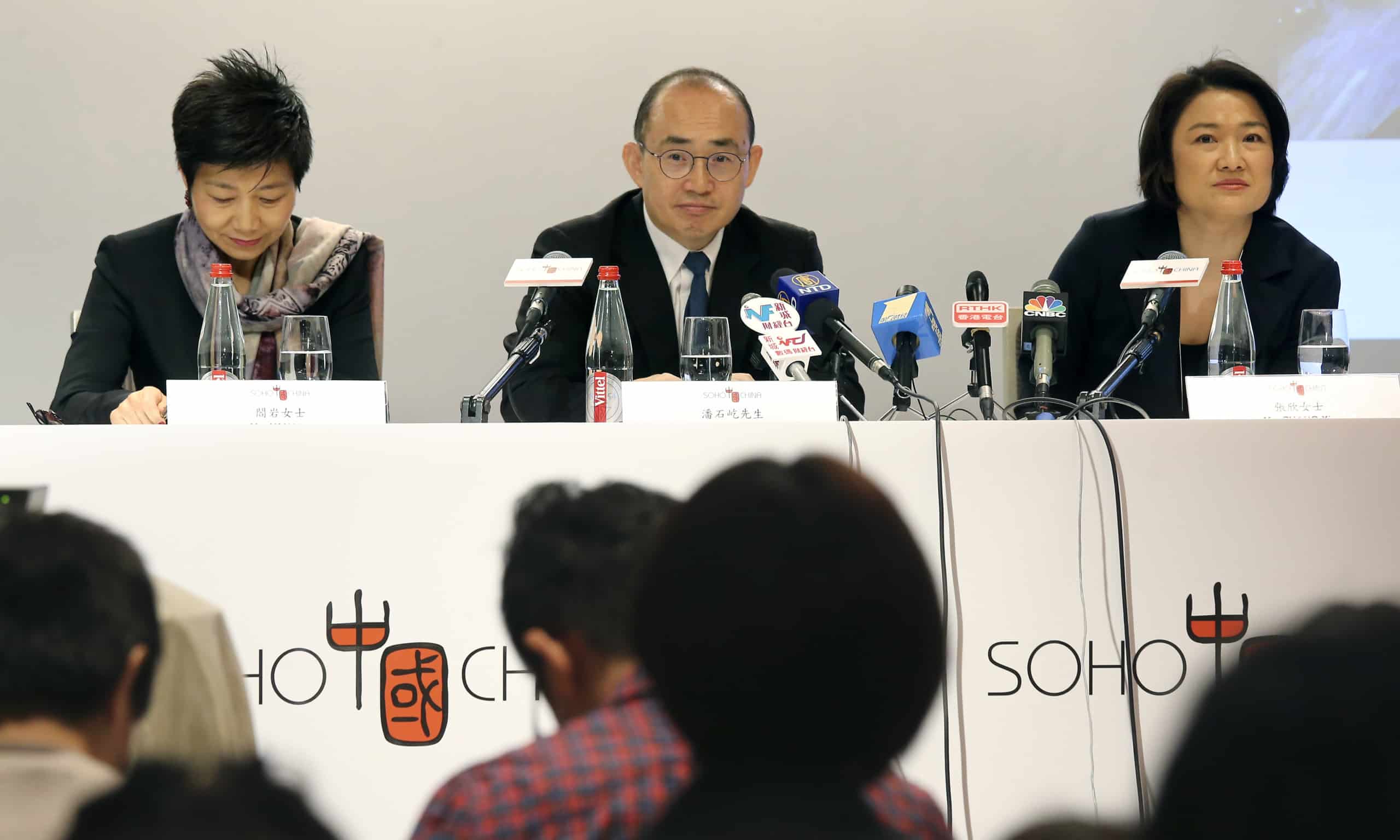
For the husband-and-wife team whose futuristic designs have shaped China’s most famous modern skylines, the last year has seen a precipitous fall.
In early July, Soho China’s chief financial officer was hit with an insider trading probe, adding to a cascade of recent issues for the property company, including government fines for electricity price gouging, debt load difficulties, and the failure of a $3 billion takeover offer from the U.S. private equity giant Blackstone. Since that deal fell through last September, Soho China’s Hong Kong-listed shares have lost 60 percent of their value.

Some of the company’s troubles are a reflection of broader issues in the Chinese property market, a sector which analysts say is rife with insider trading. But many also see the Soho founders, Zhang Xin and Pan Shiyi, as two more victims of Beijing’s recent efforts to take on some of the country’s prominent business moguls.
“It is part of this more general crackdown on private entrepreneurs in China,” says Victor Shih, an expert on Chinese political economy at the University of California, San Diego, referring to Soho’s undoing. “Xi Jinping is someone who would want all social and economic forces to bend to the will of the Party, regardless of how you made your money. Clearly, a lot of people who thought they had good connections have had to fall in line.”
Soho, which did not respond to requests for comment, was founded in 1995 and quickly became a trend-setting developer with designs by celebrity architects like Zaha Hadid. In 2007, the company raised $1.9 billion when it listed in Hong Kong: Zhang and Pan still own more than 60 percent of the listed company.
Soho has developed 54 million square feet of properties across China, according to its website, including a spaceship-shaped office and retail complex in central Beijing, a highrise on Shanghai’s historic Bund, and a group of luxury villas in the mountains near the Great Wall.




From top left clockwise: Zhongguancun SOHO in Beijing, Sky Soho in Shanghai, LEEZA SOHO in Beijing, and Wangjing Soho in Beijing. Credit: Soho China
Today, 15 years after Soho’s blockbuster IPO, the slowing Chinese economy and a series of regulatory curbs to restrict lending have rippled across the once-hot real estate market. Leading companies like Evergrande and Kaisa Group have struggled to pay their debts this year.
Soho, whose properties are mostly in major cities, is better off than some other companies — its overall net debt was equivalent to 44 percent of its equity at the end of 2021, according to company filings, only up 1 percent from the year before, compared to Sunac China Holdings’ 86 percent and Guangzhou R&F Properties’ 123 percent. But the impact of the sector’s woes are unavoidable; this spring, the company announced it would sell some Beijing and Shanghai properties at a 30 percent discount to cover debts.
It is also a difficult time for high profile private entrepreneurs in China. Over the past year, Alibaba’s Jack Ma has disappeared from public view, real estate tycoon Ren Zhiqiang was sentenced 18 years in jail, and financier Xiao Jianhua is currently facing trial after a mysterious five-year disappearance.
Zhang and Pan, Soho’s power couple founders who got engaged four days after they met in 1994, are both international and outspoken. Zhang, 56, worked in a garment factory in Hong Kong as a teenager, and later received a scholarship to attend university at Sussex. She earned a master’s degree from Cambridge — where she wrote a thesis about the privatization of the Chinese economy — before joining Goldman Sachs. Pan attended college in Hebei Province before founding a state-backed property developer on Hainan island. In recent years, he has emerged as a vocal figure on social media platform Weibo, drawing over 18 million followers.
Pan and Zhang now seem to spend most of their time in the U.S., where they bought a $26 million Manhattan townhouse and acquired a stake in the General Motors building on 5th Avenue in 2013. After the Blackstone deal fell through, photographs of the couple in the stands at New York’s U.S. Open tennis tournament circulated widely on Chinese social media. The couple have set up a scholarship for low-income Chinese students at Harvard and Yale, a decision Zhang described in a 2014 op-ed in The New York Times as being aimed at enabling “China’s best and brightest to act as a bridge between China and other nations — an important tool for modernizing the Middle Kingdom.”
…she was something that the Chinese government was proud of: an emerging entrepreneur in China. Under the current administration, someone with that profile is less attractive.
Victor Shih, from the University of California, San Diego, on Zhang Xin
Such ideas now appear out of step with China under Xi Jinping. Beijing’s emphasis these days is on encouraging homegrown innovation and technology, with the country’s wealthiest citizens encouraged to give to charitable causes at home, under the recent ‘common prosperity’ drive.
“Soho has been a private company that has been one of the most independent from the Chinese government, and closest to foreign countries,” says Shih. “Zhang Xin traveled widely, and is familiar with the global elite around the world. That used to be fine, and she was something that the Chinese government was proud of: an emerging entrepreneur in China. Under the current administration, someone with that profile is less attractive.”
Last year’s mooted Blackstone deal would have given the U.S. firm run by Stephen A. Schwarzman — a well-connected figure in Chinese political and business circles — a controlling stake in Soho, allowing Zhang and Pan to cash out and decrease their exposure to a country where they face increasing political risk. But after Chinese regulators failed to grant approval, the deal fell apart. Blackstone declined to comment for this article.
Due to the regulatory uncertainty around Soho, it’s unlikely that any other foreign investor will launch a takeover deal, says Brock Silvers, Hong Kong-based chief investment officer at Kaiyuan Capital. “Soho desperately needed balance sheet support, and once the ultra-influential Schwarzman failed to gain approval, there was no realistic hope for foreign investment,” Silvers says. “The near-term outlook for Soho isn’t great.”
After the failed Blackstone transaction, they clearly knew that more things would come. It was only a matter of time.
Chen Zhiwu, chair professor of finance at the University of Hong Kong Business School
The insider trading probe into Ni Kuiyang, Soho’s chief financial officer, which the company confirmed in a filing on July 7th, only makes matters worse. Chen Zhiwu, chair professor of finance at the University of Hong Kong Business School, says that the case sticks out as “bizarre” and “even more political” because the probe is from authorities in the mainland, not Hong Kong where the company is listed.
“After the failed Blackstone transaction, they clearly knew that more things would come,” Chen says. “It was only a matter of time. There is a political element involved, maybe they are not politically favored. The fact that they are not back on the mainland for a while shows they expect more bad things.”

Katrina Northrop is a journalist based in Washington D.C. Her work has been published in The New York Times, The Atlantic, The Providence Journal, and SupChina. @NorthropKatrina



